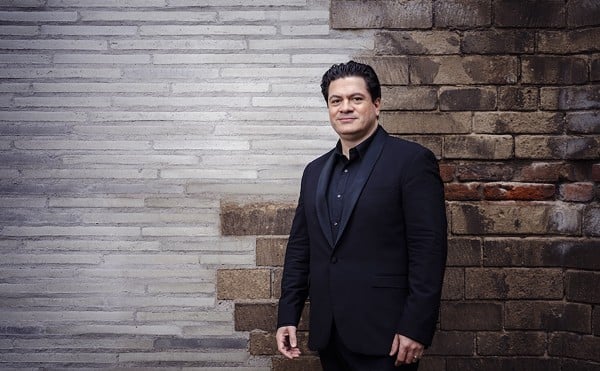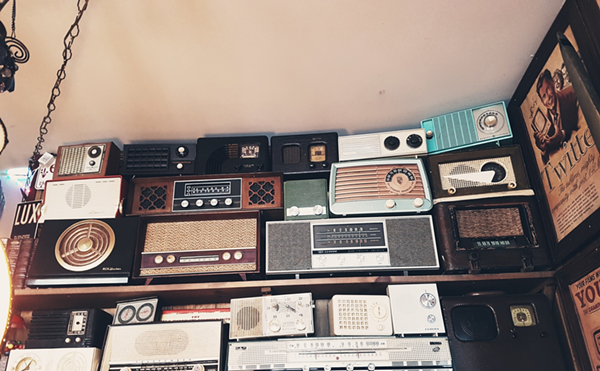There’s rarely a chance these days to witness musicians who represent both the roots and evolution of a genre.
In the ’60s, for instance, you could see music history being written in Jazz clubs all over the country, featuring artists who were not just masterful players but creating and expanding an entire musical tradition. Their names are still meaningful today; even those unfamiliar with Jazz music have heard about Miles Davis, John Coltrane and Dizzy Gillespie and know their vital contributions to Jazz.
On Sunday, Cincinnatians will have the opportunity to experience musicians of this stature in the genre of Cuban music: the Afro-Cuban All Stars.
Anyone unfamiliar with Afro-Cuban music need only think of the documentary film Buena Vista Social Club, which helped rocket Cuban music into the modern mainstream. The link between both of these ensembles, which are essentially made up of the same members but have slightly different sounds and separate identities, is Juan de Marcos González, who plays tres (a Cuban guitar) and writes the band’s compositions.
González, the son of famous Cuban singer Marcos González Mauriz, founded a traditional Son ensemble called Sierra Maestra, which recorded a very successful album in London called Dundumbanza in 1994 on the World Circuit label. In 1995, he received backing to put together a tribute album honoring the golden period of Cuban music from the ’50s, the type of music his father played.
The result was two albums. The first, A Toda Cuba le Gusta, incorporated a big band playing Cuban music from the ’50s—featured more than 60 musicians and received a Grammy nomination. The second utilized the same lineup of musicians, but a much smaller brass section and focused on the sophisticated Cuban music of the ’30s and ’40s — this album is what came to be known as the Buena Vista Social Club.
In 1997, these musicians began to tour under the name Afro-Cuban All Stars. Toward the end of the year, they decided to perform as a smaller group with the same lineup but only two trumpets instead of a full horn section. They played three concerts under the name Buena Vista Social Club. González points out that they had already created quite an international stir prior to the documentary film that followed — four million copies of the album had been sold before the film was released.
Cuban music is exciting and infectious; González refers to it as “a kind of cultural cocaine.” Characterized by highly syncopated rhythms and catchy melodies, the music is meant for dancing.
González says the 15-piece band will play a repertoire representing various periods in Cuban music history, from old favorites to contemporary tunes. They’ll also play some of the songs that garnered them six Grammy nominations and one win, as well as new songs from an album they plan to record in late summer.
The new album will be titled Breaking the Rules, a tongue-in-cheek reference to the embargo, which was extended in 2003 to include touring Cuban musicians. González says that from 1994 to 2003 Cuban musicians could perform in the U.S. and were successful. According to him, certain lobbyists blocked Cuban bands from performing here for fear that money they made might be directed into Fidel Castro’s coffers.
Members of the Afro-Cuban All Stars live all over the world, from Mexico, Sweden and Denmark to Canada and the Netherlands, and were able to get third- party visas to come for this U.S. tour — the first time a Cuban band has toured this country in six years.
“We are going to break the rules imposed by politicians,” González says. “It’s going to be a beautiful thing that says, ‘Cuba is only one.’ We have only one flag, one sprit and one culture.”
Besides creating high quality and popular recordings, González’s efforts are also preserving a musical culture that otherwise might be lost. Several of the original Buena Vista Social Club members have died; six of the original members will be on this U.S. tour.
Like the Jazz greats of the ’50s and ’60s, many Cuban musical giants are either advanced in age or have passed away. In order to help continue the tradition, González makes a point of including promising young players in his groups to help create the next generation of musicians.
He also looks to create new generations of listeners, by exposing people all over the world to Cuban music and educating them in understanding what it really is.
“We try to cover a very huge period of the history of Cuban music,” González says. “We play from the very traditional styles such as Danzon or Cha Cha Cha up to the very contemporary styles of Cuban music, what we call the Timba.
“Salsa is a commercial term to describe Cuban music of the ’50s with contemporary arrangements. What you call Latin Jazz is an improper name of what we call Afro-Cuban Jazz, because there is nothing from Columbia or Panama or Chile or Argentina in the Jazz. The basis of the music is Cuban.”
González and the Afro-Cuban All Stars are eminent entertainers, but they also take their job seriously.
“Our goal is to bring a piece of happiness, so that people will leave the concert feeling a little stronger in order to fight with the problems (they) have,” he says. “My music is plainly Cuban music. But we (see) ourselves as Cuban ambassadors.”
THE AFRO-CUBAN ALL STARS perform Sunday at the Aronoff Center for the Arts. Buy tickets, check out performance times and find nearby bars and restaurants here.





